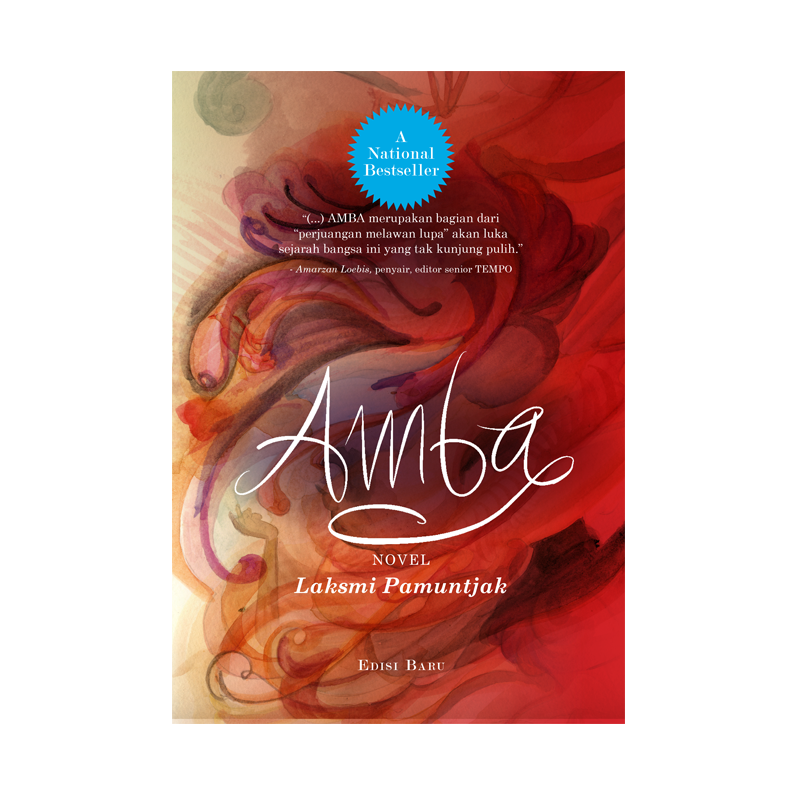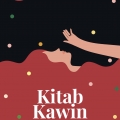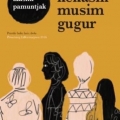Laksmi's debut novel, Amba, published by Gramedia Pustaka Utama, was released on 2 October 2012. The novel, which is a modern take on the story of Amba and Bhisma from The Mahabharata, set against the backdrop of the bloody events of 1965 and the Buru penal colony, is now a national bestseller. On 1 April 2014, the new edition of the novel, reprinted for limited circulation in October 2013, is out in bookstores nationwide. The novel is also available for pre-order at www.gramediana.com
Synopsis
Tahun 2006: Amba pergi ke Pulau Buru. Ia mencari seorang yang dikasihinya, yang memberinya seorang anak di luar nikah. Laki-laki itu Bhisma, dokter lulusan Leipzig, JermanTimur, yang hilang karena ditangkap pemerintah Orde Baru dan dibuang ke Pulau Buru. Ketika kamp tahanan politik itu dibubarkan dan para tapol dipulangkan, Bhisma tetap tak kembali. Novel berlatar sejarah ini mengisahkan cinta dan hidup Amba, anak seorang guru di sebuah kota kecil Jawa Tengah. "Aku dibesarkan di Kadipura. Aku tumbuh dalam keluarga pembaca kitab-kitab tua." Tapi ia meninggalkan kotanya. Di Kediri ia bertemu Bhisma. Percintaan mereka terputus dengan tiba-tiba di sekitar Peristiwa G30S di Yogyakarta. Dalam sebuah serbuan, Bhisma hilang selama-lamanya. Baru di Pulau Buru, Amba tahu kenapa Bhisma tak kembali. Dan mati.
Format: Paperback, 494 pages. Publisher: Gramedia Pustaka Utama. Year of Publication: October 2012
Praise for "AMBA (New Edition)":
-
Novel ini amat kaya tekstur dan berlapis-lapis; sebuah karya yang menautkan secara canggih sejarah yang terhapuskan, kenangan hidup dan mitos formatif tentang perang dan perdamaian… Laksmi Pamuntjak menghidupkan kembali secara mengagumkan sebuah zaman pergolakan yang nyaris terlupakan, bersama semua korban dan pelakunya. Selama seminggu lamanya saya luruh seluruh dalam dunia novel ini, dan ketika saya keluar dari dalamnya, saya tetap masih merasakan sihirnya selama berhari-hari.
- Aamer Hussein, Novelis
-
Novel yang disusun secara apik berdasarkan riset yang teliti ini bukan hanya merupakan karya yang menggugah dan membuat kita tak ingin berhenti membacanya, tapi juga sebuah sumbangan penting dalam khazanah pustaka tentang 1965.
- Pamela Allen, Associate Dean, Faculty of Arts, University of Hobart, Tasmania
-
Laksmi Pamunjak's luminous imagination has brought us a seminal work of Southeast Asian literature. The Question of Red explores with urgent context and brilliant writing one of the world's least known but most brutal political mass murders of the twentieth century. This profound meditation on memory and forgetting deserves a worldwide audience.
- Margaret Scott Rauch, Indonesia Scholar, Adjunct Assistant Professor of Public Administration, NYU.
-
In Amba/The Question of Red, Laksmi Pamuntjak masterfully weaves a web of narratives dealing with a dark, bloody chapter of Indonesia’s history, the 1965-66 anti-communist purge – a topic that remains controversial to this day. It is more than a love story or a historical novel, it is also an erudite reflection of the stunning amalgam of what Indonesia is: a Muslim-majority country influenced by both the modern West and its Hindu heritage.
- Yenni Kwok, journalist for Time and The New York Times
-
The way Laksmi Pamuntjak approached the traumatic events of the 1965 coup, the massacres and persecutions in Amba/The Question of Red shows her mastery as an author. By interweaving story lines and changing environments the writer engages her readers on various levels. For an Indonesian public that has been immersed in a one-sided state-organised presentation Amba offers a new perspective involving real humans while through The Question of Red an international public is offered an insight in the effects that the events of 1965 had on lives through a novel that is literary in its construction and language but very down to earth in its protagonists.
- Wim Manuhutu, historian and review editor of Moesson magazine in the Netherlands.
-
If I was allowed only one word to describe Laksmi Pamuntjak’ s The Question of Red, I would say: stunning! If two, my other word would be: stylish. In the Indonesian/Indian world, the Mahabharatha is what Homer’s Iliad is to the Occident; having influenced their lives for millenniums, still continues to do so. Pamuntjak’s clever use of characters and allusions to events described in the epic, underscores the significance and weight the events of the mid-sixties bear on all Indonesians to this day, and will continue to, way into the future. The author’s unemotional, deadpan rendering will scare the life out of you. Is this what men do to other men?
- Raman TRR Krishnan, Author, publisher, editor, critic, bookshop owner, Kuala Lumpur, Malaysia.
-
I am always blown away by the meticulous research that goes into Laksmi's books and the depth and breadth of her talents. Whether she is taking on the complex and varied cuisine of her native Indonesia (Jakarta Good Food Guide), breathing life into renowned works of art (The Diary of R.S.: Musings on Art) or tackling the thorny history of Indonesia's darkest era, there is little she cannot master or distill for readers at home and abroad. This, like her other works, will endure as an important reference for anyone trying to better comprehend this vast archipelago.
- Jason Tedjasukmana, Time magazine's Indonesia correspondent from 1999-2012.
-
In the book The Question of Red Pamuntjak takes the reader on a moving journey of a young love set against the turmoil of 1965. Based on thorough research but also interwoven with the great myths of our time, Pamuntjak manages to bring back to life these turbulent years with amazing details. Despite the film The Act of Killing, little is known about the terrible massacres that took place in 1965. The enormous success of the book in Indonesia shows at what crucial time the book was published. Now an international reception of the book is crucial. The Question of Red is one of the best Indonesian books I have read. I was drawn into the story immediately and it wouldn’t let go off me for many weeks.
- Katrin Sohns, Program Director, Goethe Institut Jakarta.
-
Laksmi Pamuntjak’s novel is a skillful interweaving of the epic and the personal, the mythic and the recent past. In its meditation on the significance of the most humble of lives and the intimacy and immediacy of the most momentous of historical events, Amba reminds us that lodged within the breast of History is a living, beating heart.
- Tiffany Tsao, Editor-at-Large, Asymptote
-
There are hidden meanings in Laksmi’s characters in her novel—be it Amba, Bhisma, Samuel, or Salwa—far more subtle and affecting than the authorial messages/commentaries present in most Indonesian novels.
- Antara News
-
An affecting blend of history, mythology and romance, The Question of Red will resonate with audiences well beyond Indonesia's borders. Pamuntjak's evocative prose and story telling skills make for an engrossing read.
- Pallavi Aiyar, journalist for The Hindu Times
-
What makes Amba not merely a historical epic or a common love story is the stylishness of its prose, the psychological depth of its characters, its reflexivity and erudition, and the meticulous research that lies at its heart, which breathes life to the setting and all the life situations and existential dilemmas it encompasses... What stands out first and foremost is the skill with which (its author) mines the potential of the Indonesian language. On the whole, the poetry of its prose… is one that succeeds in articulating the unutterable (in life’s conundrums), depicting scenes that are hard to render, and in so doing pulling every scene closer towards ever deeper dimensions of meaning. There is an immense skill at play in exploring diction and playing around with its semantic possibilities…
- Kompas
-
In less than seven weeks, the phenomenal novel Amba is already in its second printing…
- Her World
-
This novel… comes to us indirectly ‘at the point of forgetting’. A disappeared person; to stress his absence, the novel presents only the few letters unearthed from beneath the tree in a corner of Buru Island. We get the voice of a person, Bhisma, who ‘twinkles and fades.’ Amba is one of a few novels that stress the sense of anxiety plaguing us in Indonesia these days: the anxiety that the terrifying ‘events of 1965’ will be lost, stripped from collective memory. We do not want to return to brutality.
- Tempo
-
Laksmi’s combination of poetry and prose achieves its strongest harmony in the letters…they exceed their function as the bearer of news; instead, they reinforce the subject in his absence. They arise like an echo.
- Tempo
-
… in terms of its grasp of the material, its erudition, the depth of its humanity, and its stylistic mastery, (Amba) is simply world-class. In Indonesia itself this is undoubtedly one of the towering achievements of our country’s literature.
- Bambang Sugiharto, literary critic and Professor of Aesthetics, Parahyangan University.
-
Amba is the best (Indonesian) novel since the Earth of Mankind tetralogy.
- J.B. Kristanto, journalist, literary critic
-
A compelling love story, elegantly and passionately told by one of the sharpest minds of her generation, set in a history held as most taboo in [Indonesia].
- Ariel Heryanto, Associate Professor of Indonesian Studies and Head of Southeast Asia Centre, Australian National University.
-
With a stunning diction, Laksmi Pamuntjak offers a love story that isn’t just colossal but also profoundly moving. It serves up not just romance but also opens up many windows into history and lessons of life.
- Dewi Lestari (Dee), best-selling novelist, short story writer, songstress.
-
The novel combines poetic language and the determination to use literature as an instrument of enlightenment without ever denying the aesthetics.
- Neue Zuercher Zeitung
-
(Amba/Alle Farben Rot) is an absolute must-read; ... it holds so many important lessons about Indonesia.
- Die Zeit
-
It takes a while to discover what is what in this novel. And this perfectly captures the dizzying unsteadiness of a traumatized world poised between normalcy and catastrophe.
- Frankfurter Allgemeine Zeitung, Top 8 Books of the Frankfurt Book Fair 2015
-
The most important Indonesian novel of this winter...
- Cornelia Zetzsche, Weltempfaenger 2015 jury member.
-
This heart wrenching novel is much more than a long overdue look at Indonesia’s genocidal past. It is a poetic reflection on the traumas that divide a society and the emotional as well as political complexities in addressing and thus healing them.
- Ilija Trojanow


